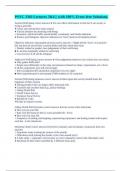PSYC 3302 Lectures 3&4 || with 100% Error-free Solutions.
Societal Well-being correct answers ● We can collect information to find out if our society is
living a good life
● Count, rate and measure many aspects
● Various domains for assessing well-being:
○ Economic, physical health, mental health, community, and family indicators
● Positive psychologists: objective indicators (or 'facts') paint an incomplete picture
Objective indicators (incomplete picture) correct answers ○ Might tell the "facts" of a person's
life, but they do not tell how a person thinks and feels about these facts
○ Weakly related to people's own judgements of their well-being
■ Ie. income marginally related to well-being
○ Can you have it all and be unhappy?
Subjective Well-being correct answers ● Own judgements based on own criteria (my own story)
● Why gather SWB data?
○ People react differently to the same circumstances (based on values, expectations, etc.). Even
if all the components may still not be happy
○ Info on happiness/life satisfaction important it its own right!
■ Most important goal to most people (7000 students in 42 countries)
Societal Well-being measures correct answers ● Most agree that society should foster the
happiness of their citizens
● Asking people if they are happy offers important info
● Correlate and use these data (e.g., policy-making)
○ Gallup World Poll
○ World Values Survey
○ European Social Survey
● Reliable & Valid
WB data to improve society
Gallup World Poll Outcomes correct answers ● Swiss versus Latin Americans
● How you see your life:
○ Rate your life based on best to worst possible life - Swiss
● How you live your life:
○ Frequency of smiling and laughing, experiencing enjoyment, and feeling treated with respect
each day - Latin Americans
Duchenne Smile correct answers ● Involves voluntary and involuntary contraction from two
muscles:
○ Zygomatic major (raising the corners of the mouth)
○ Orbicularis oculi (raising the cheeks, crow's feet around eye's)
● A fake smile = zygomatic only because we can't voluntarily contract the orbicularis oculi
● Duchenne & fake smile controlled by 2 different brain areas
, ○ Left brain damage to motor cortex (controls voluntary movement), asked to smile, right side of
smile does not form properly (asymmetrical)
○ Same patient, spontaneously laughs, the smile is normal with no asymmetry
○ Thus, genuine smile is controlled by another part of the brain
Authentic Smiles: predictive of good outcome: Harker & Keltner (2001) correct answers ●
Trained coders: authentic (Duchenne) or inauthentic/forced-smile (non-Duchenne)
● 141 women
○ Followed up at 27, 43, and 52 years
● Examined personality, quality of relationships, marital history, personal well-being
● Authentic smile = lower neg't affect, higher competence, higher affiliation with others, lower
physical and psychological difficulties
● But why?
Hedonism Theory correct answers Happy life = maximize pleasure, minimize pain
Roots in utilitarianism (Bentham, 1978)
Desire Theory correct answers Happy life = getting what you want
Objective List Theory correct answers ● Objective list theory
○ Happy life = achieves worthwhile pursuits
○ Move away from "feelings" and into things that are "truly valuable"
○ Achieve worthwhile pursuits???
■ Career accomplishments, friendship, freedom from disease and pain, material comforts, civic
spirit, beauty, education, love, knowledge, and good conscience
○ One shortcoming:
■ A big part of how happy we judge a life to be takes into account feelings and desires
PANAS correct answers ● Diener and Emmons (1984) - used 9 descriptors for positive affect
(happy, pleased, joyful, enjoyment) and negative affect (worried/anxious, frustrated,
angry/hostile, unhappy and depressed/blue)
● Others use Positive Affect, Negative Affect Inventory (PANAS) (10 PA and 10 NA; 1-5 rating
scale)
● PA and NA bidimensional or one dimension?
● Controversy if negatively correlated (one at a time) or independent (both at the same time)
● More to do with measurement
● If "right now" you are relaxed/happy, then unlikely depressed/tense
● If "over the past month" - then likely a mix of both
Satisfaction With Life Scale (SWLS) correct answers ● Represents one's assessment of one's
own life
● Satisfied (dissatisfied) where there is little or no (substantial) discrepancy between the present
and an ideal/ deserved situation
● More recently...
○ Domain satisfaction (job, family, health, leisure, social, sex, body, etc.)
○ Provides more nuanced information about what most contributes to SWL




